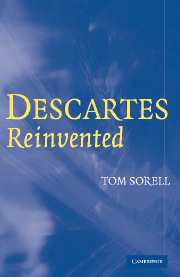Book contents
Conclusion
Published online by Cambridge University Press: 20 July 2009
Summary
The innocent Cartesianism that emerges from this book is partly a doctrine of human limitation. Human beings are not naturally cut out for natural scientific understanding, and not naturally cut out for an elevated moral and political life. They are not naturally cut out for natural scientific understanding because so little of that is sense-based, and because it is sense-based understandings of things that come naturally to us. To develop sophisticated natural science, human beings have to develop concepts, especially mathematical concepts, that radically revise sense-based understandings. To develop an elevated morals and politics, human beings have to be guided by concepts of individual and collective improvement and not by appetites. The senses and the appetites hold human beings back from the highest degree of human improvement. They are useful for survival, but they also generate much false belief and inevitably unsatisfied desire. The answer to sense-based understanding and appetite alike is reason, or the capacity for standing outside sense-based understanding and appetite and getting beyond them.
In the case of sense-based understanding of the natural causes of appearance, there are two ways of standing outside, according to Descartes. One is the method of doubt; the other is mechanics, or the explanation of appearance by reference to the motions of the parts of bodies. Innocent Cartesianism does not follow unreconstructed Cartesianism in this picture of how to stand outside sensory appearance. First, the success of mathematical physics is well established.
- Type
- Chapter
- Information
- Descartes Reinvented , pp. 167 - 172Publisher: Cambridge University PressPrint publication year: 2005



